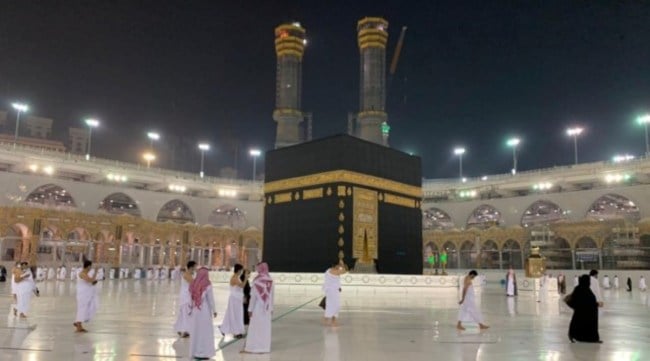Opinion Indian pilgrims’ road to Mecca just got easier
Saudi Arabia has extended the Umrah visa duration to 90 days and introduced a four-day transit visa cater to the diverse needs of Indian pilgrims, offering enhanced flexibility
 Establishing the “Tasheer” centre (Saudi visa service centre) represents a strategic move to streamline and expedite visa services for Indian Umrah pilgrims. (Saudi Press Agency/Handout via Reuters/File)
Establishing the “Tasheer” centre (Saudi visa service centre) represents a strategic move to streamline and expedite visa services for Indian Umrah pilgrims. (Saudi Press Agency/Handout via Reuters/File) During the recent visit by the Saudi Minister of Hajj and Umrah, Tawfig Al-Rabiah, to India, the inauguration of the “Nusuk” platform/application exhibition marked a significant step in ties between the two countries. This initiative aimed to spotlight the electronic services tailored to enrich the pilgrimage experience for Umrah performers.
By showcasing the Nusuk platform, the exhibition sought to familiarise visitors with the prominent historical and Islamic landmarks in Makka and Madinah. It underscored Saudi Arabia’s objective to elevate the services provided to Umrah pilgrims and amplify the transformative impact of their spiritual journey.
Concurrently, establishing the “Tasheer” centre (Saudi visa service centre) represents a strategic move to streamline and expedite visa services for Indian Umrah pilgrims. This centre aligns with the ongoing commitment to elevating service standards and harnessing cutting-edge technology to efficiently cater to the needs of pilgrims.
The Ministry of Hajj and Umrah remains steadfast in its dedication to continuously enhance efforts to facilitate the pilgrimage journey for all visitors to Saudi Arabia, irrespective of their visa type, affirming its inclusive approach to Umrah performance.
The Indian community, around two million in Saudi Arabia, has played a pivotal role in the nation’s progress. Their significant contributions span economic, social, cultural, and academic domains, and have created a lasting impact on Saudi society’s development and enrichment. Their concerted endeavours have propelled the nation’s advancement and fostered cultural diversity and mutual understanding, strengthening the fabric of the nation’s social tapestry.
To facilitate the arrival of more Umrah pilgrims from India, an agreement was reached to increase flights dedicated to transporting pilgrims, including direct flights from various Indian airports to Jeddah and Madinah airports. The seating capacity on Saudi Airlines has also been expanded to cater to the escalating demand for performing Umrah, streamlining and enhancing the pilgrimage experience for Indian travellers.
In anticipation of a surge in the number of Indian Umrah pilgrims, the Kingdom of Saudi Arabia has implemented significant initiatives to streamline arrival procedures. These measures are designed to facilitate the entry of all individuals wishing to visit the Two Holy Mosques and explore diverse tourist destinations across the Kingdom, underscoring the nation’s commitment to ensuring a seamless and enriching pilgrimage experience for Indian travellers.
The enduring and evolving relationship between Saudi Arabia and India is marked by profound cultural and commercial linkages, culminating in a robust bilateral partnership. This alliance is underpinned by mutual respect and comprehension, reinforced by common objectives centred around sustainable development and innovative security strategies as burgeoning global powers. Their resilient economic and trade connections have been instrumental in strengthening their bond and fostering prospects for cooperation across diverse domains.
The recent revisions in the Umrah visa rules for Indian Muslims represent a notable step forward in enhancing accessibility and inclusivity. The reforms include eliminating restrictions tied to their previous visa status, alongside implementing an e-visa platform and streamlining the application procedure with swift approvals.
Additionally, extending the Umrah visa duration to 90 days and introducing a four-day transit visa cater to the diverse needs of Indian pilgrims, offering enhanced flexibility throughout their spiritual journey.
These changes are designed to cultivate a more welcoming and secure environment, particularly for women undertaking independent Umrah trips, thus championing gender equality and fostering a safer and more inclusive experience for all pilgrims.
In conclusion, the concerted endeavours between Saudi Arabia and India, exemplified by their recent initiatives and progress, are dedicated to enhancing the pilgrimage journey for Indian Umrah pilgrims. Simultaneously, these efforts fortify the bilateral partnership between the two nations, fostering greater cultural, economic, and social exchange with a vision of mutual prosperity and harmonious collaboration.
The writer is the Ambassador of the Custodian of the Two Holy Mosques to India






